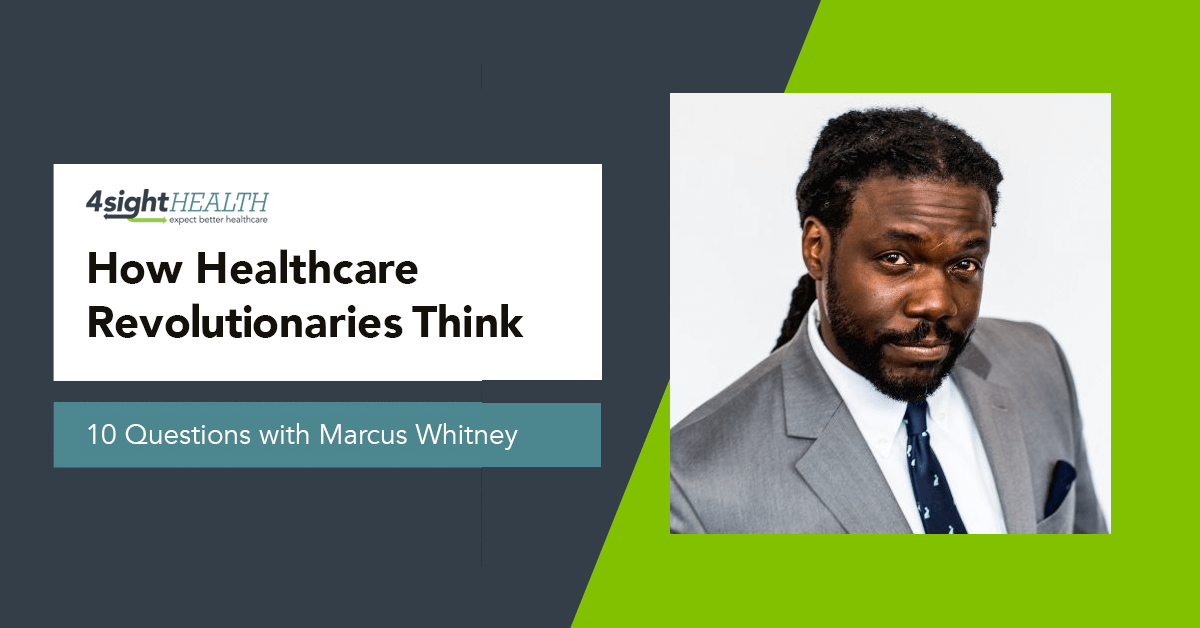September 12, 2023

How Healthcare Revolutionaries Think: 10 Questions With Marcus Whitney
Welcome to the latest installment of 4sight Health’s series, How Healthcare Revolutionaries Think. Our interview series profiles healthcare instigators who believe that outcomes matter, customers count and value rules.
As I interviewed Marcus Whitney for this series, all I could think about was the ad slogan from the old BASF chemical company commercial: “We don’t make a lot of the products you buy. We make a lot of the products you buy better.” That slogan captures what Whitney is doing as the founder and managing partner of Jumpstart Nova, a Nashville-based venture capital fund that invests in healthcare startup companies that are founded and owned by Black people. While Whitney built a much-needed path for Black healthcare entrepreneurs, he’s also building a better healthcare system for all of us.
Whitney didn’t make the healthcare system you use, but — like the BASF campaign — he’s making the healthcare system you use better.
I talked to Whitney about what motivates him to make the healthcare system better for its customers and the attributes he looks for in healthcare entrepreneurs before he writes them a check.
You can also listen to a podcast interview with Whitney on why working as a waiter or waitress as a young adult may be the best education for future healthcare entrepreneurs.
1. Marcus, I know you didn’t start your career in healthcare, but give me your definition of a healthcare revolutionary anyway.
Whitney: In order to be a healthcare revolutionary, at least what I think I’ve learned so far, is that you first have to learn how healthcare works no matter what direction you’re coming in from. You can’t just say, “Hey, I’m going to fix healthcare today.” It’s easy to be a healthcare anarchist or a healthcare nihilist, but to be a healthcare revolutionary you first have to really understand where the dysfunction is in order to form a viable opinion about how to bring a revolution to healthcare. I’ve spent most of the last nine years figuring out how this doggone thing works. I can’t claim to know everything about how it works, but at this point I have enough data to know some of the fundamental flaws with how the healthcare system in the U.S. works.
A true revolution also requires many people. It’s not something you can go at alone. One of the most important jobs of a healthcare revolutionary is to communicate. You must be an effective communicator to get others to join you in whatever it is you’re trying to do to make healthcare better for all of us.
2. What motivates you to try to make healthcare better for all of us?
Whitney: Our healthcare system is a multigenerational asset. Frankly, I’m not that interested in working on the healthcare system as it exists today. I’m interested in working on the system for our children and our children’s children. Our current system isn’t even 100 years old. It’s not as old as the sun, the moon, the stars, the mountains or even some of the trees we see in our forests. It’s not that old. It doesn’t have to be the same system that my children and grandchildren are stuck with. We have the opportunity to change it, and we can and should change it for the future. That’s what motivates me.
3. That’s the idea of leaving something better than you found it or making things better for the next generation. I get it. You mentioned data. You have enough data to know flaws in the current system. Do you need data to be an effective communicator and get others to join you as a revolutionary?
Whitney: Data does tell you where the problems are, but data alone is not an effective communication tool unless it’s wrapped in a great narrative or in a noble vision and mission. Data lets you stand on solid ground. It helps you prioritize. It helps you know where to focus. It may even guide you to solutions. But I don’t find data alone to be a very effective communication tool. I think narrative, whether it be a vision or a story about something awful that happened, those are far better communication tools for building a movement. So, I do think you need both. You need a little left brain and a little right brain if you want to be a healthcare revolutionary.
4. Do you have a favorite healthcare revolutionary, past or present, who can pull off that left-brain, right-brain balance that you’re talking about?
Whitney: David Johnson at 4sight Health is pretty high on my list. I have the benefit of working with him on the board of the Healthcare Financial Management Association (HFMA). I get to watch him say things in rooms of powerful people that they may not want to hear or that I don’t hear often in the healthcare industry.
Another would be former Sen. Bill Frist, M.D. (R-Tenn.). He came from the political establishment and is working on challenges related to the environment and climate. He founded and chairs NashvilleHealth, which is generating data to find the root causes of our poor health outcomes here, despite having a relatively high standard of living and a booming economy. He also speaks pretty openly about the need for gun reform. I mean, this guy was the Senate majority leader for the Republican Party.
In both cases, with Johnson and Dr. Frist, they had tremendous success in their respective professions, but rather than packing it all in and going to the beach or collecting art, they decided to take on a cause. They use their platforms to do something better for society.
5. Do you think you’re a healthcare revolutionary or at least on your way to becoming one?
Whitney: I’m not entirely sure. I came to healthcare as an outsider via venture capital. I see myself as a helper. I’m here to help founders who want to change healthcare for the better. I help them by getting capital and by guiding them in ways that I know help early-stage companies be more successful. That’s my day-in, day-out job. If I do that well, I generate good returns for my investors and that puts me in a position to gain more assets under management and help more founders succeed. That’s the virtuous circle that I’m trying to turn into a flywheel. As an entrepreneur and investor, I get to be my authentic self. The way that I present appears to be revolutionary, but in reality, I don’t have that much to lose. That’s the part of me that makes me not necessarily feel all that revolutionary.
6. When you say you search out founders who want to change the healthcare system for the better, have you developed a sixth sense about who’s just in it for the money and who really wants to change the system? Like a house flipper who wants to flip houses only for the money or one who wants to flip houses to improve a neighborhood?
Whitney: That’s a great question. I would say that I can sense when someone is more in it for the money than they are for the mission, but what I will say is that being in it for the mission more than the money is not somehow an indicator of company success.
7. Why is that? Explain it to me.
Whitney: You really need both. Money and mission. You need a balance. If it’s just mission, then maybe a company is not the right vehicle for you to make change. You should be an activist or advocate of some kind where generating a profit is not necessarily a fundamental requirement of your job. There are lots of ways to make change that don’t include starting a company, running a company and growing a company. On the other hand, if all they care about is the money they won’t be obsessed enough about the mission to care about being the absolute best at what they do and executing toward that mission. Again, having both at the right balance is what I’m looking for. I’m not looking for an either-or.
8. You describe yourself as an outsider to healthcare, but you fund healthcare startups. At what point in your life did you first notice there’s something not right about how we receive care or pay for care in the U.S.?
Whitney: The first time the light went on for me was in my young adult life. I’d started a family and had a health scare. I had insurance at the time, but it wasn’t great insurance. I went to the emergency room, and they ran a battery of tests. Turned out everything was fine, but then a month later I got a pretty big bill and I wasn’t prepared for it.
At no point in that entire process did anyone say, even at discharge, “Hey, you’re going to get a bill for what just happened, and it’s going to be X, Y, Z.” Or, “Hey, these are the tests we plan on running, and here’s how much they’re going to cost you so you can make a decision about whether you want all of them, some of them or none of them.” My first aha moment in healthcare was a surprise bill.
9. I read that you co-own a soccer club and that you’re a jujitsu champion. I’m neither. So, I’m curious about how those experiences shape how you think, how you think about healthcare, how you do your work and how you deal with other people.
Whitney: My commitment to be an athlete at 47 is all physiological. I’m telling my whole being that you are preparing for competition. In context of a fund or just being in business, it keeps me constantly alert, aware and conscious of the fact that I am competing and have to do the things that are necessary to an effective competitor. It’s not about winning. It’s about how to compete well.
Competing well means being prepared. It means showing up on time. It means being disciplined. If you have a big day the next day, go to sleep early the night before. Being an athlete reminds me that I’m a physical being. It reminds me that to be present and be in my body, even when doing knowledge work at a computer, in front of a mic, in a boardroom, I’m still a physical being. That impacts how I show up and how I perform and how sharp my mind is and how responsive I am to really tough situations. It’s preparation. I’m not just winging it.
10. Do you have any quieter or less active hobbies when you’re not running your fund, playing soccer or competing in a jiujitsu tournament?
Whitney: Outside of the things that most people know about me, it comes down to my family and rest. Family and rest. When I’m not doing family things, I love to rest. I love to sleep. I lay on the couch and watch TV. I love to veg out. I like to veg out on the couch watching BBC. Generally speaking, they’re talking about things that don’t really concern me that much. I have it on in the background, and I’m just like, “Oh, that’s nice, whatever.” And next thing I know, I’m out.
Burda’s Final Bit
Waking a jiujitsu champion up from a well-earned nap probably is a bad idea, and one I won’t ever try. But I’m glad Whitney can find a little time to rest in between arranging rounds of venture capital funding for new companies whose founders have the right balance of mission and money. I’ve always said what’s good for healthcare consumers is good for healthcare business. Whitney gets that. It’s that powerful mix of mission and market that will rebuild the U.S. healthcare system into one that works for its customers for years and decades to come. I’m glad Whitney has his strong hands firmly on both those levers.
Marcus Whitney is a founding partner of Jumpstart Health Investors (JHI), the most active early-stage healthcare venture capital firm in America. Of JHI’s funds, Marcus leads Jumpstart Nova, the first healthcare venture fund in America focused on Black-founded and Black-led startups. Marcus is also cofounder and minority owner of the major league soccer team, Nashville Soccer Club. Marcus is the author of the Amazon No. 1 best-selling book “Create and Orchestrate,” about claiming your creative power through entrepreneurship. Marcus is an Aspen Health Innovators fellow, and a member of the board of the Healthcare Finance Management Association (HFMA).
Jumpstart Health Investors focuses exclusively on health, healthcare, and wellness investments. The Jumpstart platform has been assembled to create opportunities for investors by solving key factors such as access, risk mitigation, diversification and portfolio management. Investor partners access various funds and direct deals across all stages: seed, venture, growth, scale and maturity.
Read more Healthcare Revolutionary interviews.
- June 2023: Demi Radeva
- May 2023: Michael Pitt, M.D.
- April 2023: Rebeckah Orton
- February 2023: Dan Trigub
- January 2023: Melina Davis
- December 2022: Bruce Brandes
- November 2022: Lena Chaihorsky
- See the full series here.





